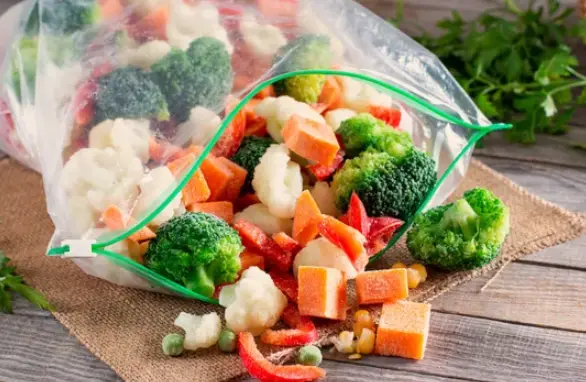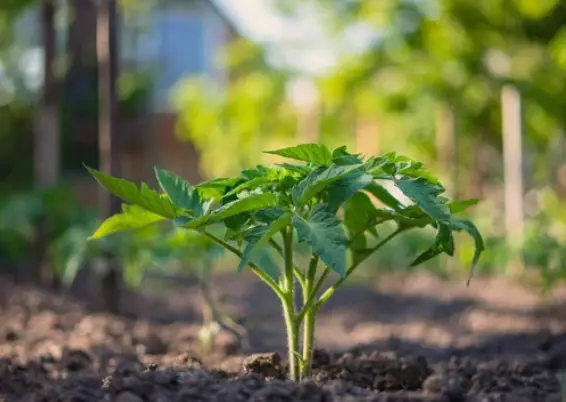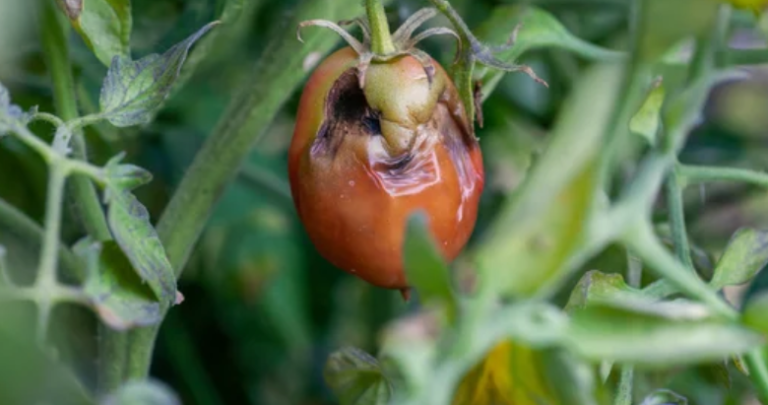Refrigerator Bags for Vegetables: Keep Your Produce Fresh for Longer
Refrigerator bags for vegetables have become increasingly popular in recent years as more people are looking for ways to reduce food waste and keep their produce fresh for longer. These bags are designed to help extend the life of fruits and vegetables by creating a controlled environment that slows down the ripening process and prevents spoilage.
One of the main benefits of using refrigerator bags for vegetables is that they can help reduce food waste. By keeping produce fresh for longer, people are less likely to throw away fruits and vegetables that have gone bad. This not only saves money but also helps reduce the amount of food that ends up in landfills.
Another benefit of using refrigerator bags for vegetables is that they can help people eat healthier. When fruits and vegetables are kept fresh for longer, people are more likely to incorporate them into their meals. This can lead to a more balanced and nutritious diet, which can have a positive impact on overall health and well-being.
Importance of Refrigerator Bags for Vegetables
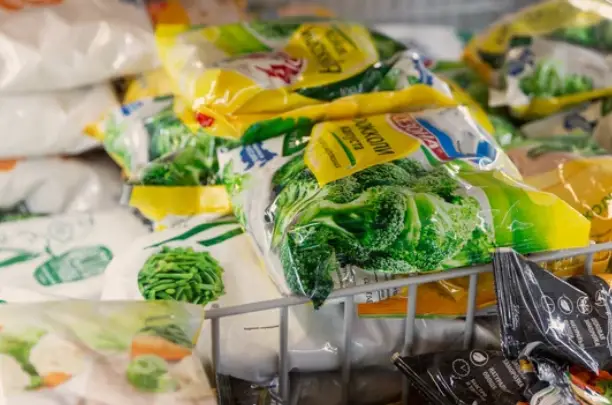
Refrigerator bags for vegetables are important for keeping vegetables fresh and crisp for a longer period of time. These bags are designed to create a microclimate that helps to maintain the freshness of vegetables by regulating humidity and temperature levels.
One of the main benefits of using refrigerator bags for vegetables is that they help to prevent moisture loss. Vegetables that are exposed to dry air can quickly lose their moisture content, which can cause them to wilt and become limp. By storing vegetables in a refrigerator bag, the bag helps to trap moisture and prevent it from escaping, thus keeping the vegetables fresh and crisp.
Another benefit of using refrigerator bags for vegetables is that they help to prevent the growth of bacteria. Vegetables that are stored in open containers or plastic bags can easily become contaminated with bacteria, which can cause them to spoil quickly. Refrigerator bags for vegetables are designed to be airtight, which helps to prevent bacteria from growing and keeps vegetables fresh for a longer period of time.
In addition to preventing moisture loss and the growth of bacteria, refrigerator bags for vegetables also help to prevent the transfer of odors. Vegetables that are stored in open containers or plastic bags can easily absorb the odors of other foods in the refrigerator. By storing vegetables in a refrigerator bag, the bag helps to prevent the transfer of odors and keeps the vegetables smelling fresh.
Overall, refrigerator bags for vegetables are an important tool for anyone who wants to keep their vegetables fresh and crisp for a longer period of time. By regulating humidity and temperature levels, preventing moisture loss, the growth of bacteria, and the transfer of odors, these bags help to maintain the quality and freshness of vegetables.
Types of Refrigerator Bags for Vegetables
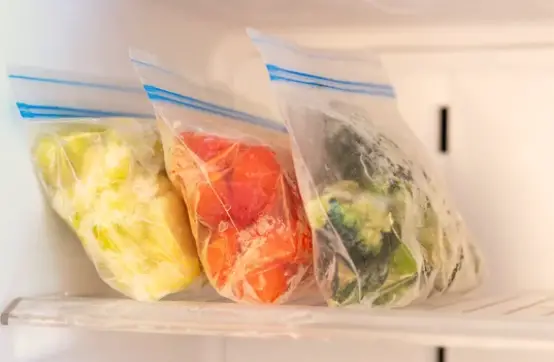
Refrigerator bags for vegetables come in various materials, sizes, and designs. Here are some of the most common types of refrigerator bags for vegetables:
1. Reusable Mesh Bags
Reusable mesh bags are made of a lightweight, breathable material that allows air to circulate around the vegetables. This helps to prevent moisture buildup, which can cause vegetables to spoil quickly. They are also machine washable, making them easy to clean and reuse.
2. Reusable Plastic Bags
Reusable plastic bags are made of a durable, BPA-free material that can be washed and reused many times. They are available in various sizes and designs, including zippered and drawstring closure options. These bags are great for storing leafy greens, carrots, and other vegetables that need to be kept dry.
3. Silicone Bags
Silicone bags are a newer type of refrigerator bag that is made of food-grade silicone. They are durable and can be reused many times. They are also dishwasher safe, making them easy to clean. Silicone bags are great for storing vegetables that need to be kept moist, such as mushrooms and asparagus.
4. Cotton Bags
Cotton bags are another type of reusable bag that is great for storing vegetables. They are made of a breathable material that allows air to circulate around the vegetables. They are also machine washable, making them easy to clean and reuse. Cotton bags are perfect for storing potatoes, onions, and garlic.
Overall, the type of refrigerator bag you choose will depend on your personal preferences and the types of vegetables you plan to store. It’s important to choose a bag that is breathable and easy to clean to ensure your vegetables stay fresh for as long as possible.
How to Use Refrigerator Bags for Vegetables
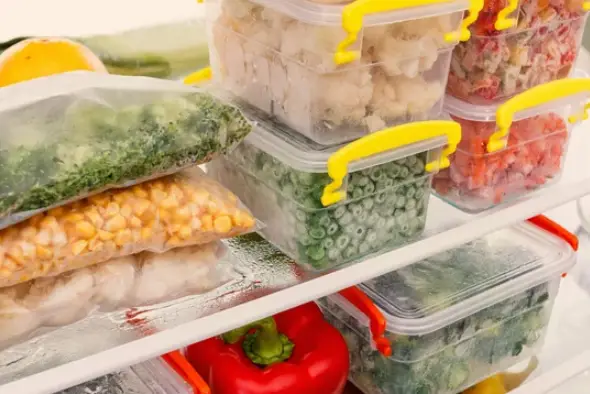
Preparation
Before using refrigerator bags for vegetables, it is important to prepare the vegetables properly. First, wash the vegetables thoroughly to remove any dirt or debris. Then, dry them completely to prevent moisture buildup inside the bags.
Next, sort the vegetables based on their type and storage requirements. For example, leafy greens like lettuce and spinach should be stored separately from root vegetables like carrots and potatoes.
Storage
Once the vegetables are prepared, it’s time to store them in the refrigerator bags. Here are some tips for using refrigerator bags for vegetables:
- Use bags that are specifically designed for storing vegetables. These bags are made from breathable materials that allow air to circulate, which helps to prevent moisture buildup and spoilage.
- Label the bags with the name of the vegetable and the date of storage to keep track of how long they have been in the refrigerator.
- Fill the bags loosely to allow air to circulate. Overcrowding the bags can cause the vegetables to bruise and spoil faster.
- Store the bags in the crisper drawer of the refrigerator, which is designed to maintain a higher level of humidity that is ideal for storing vegetables.
- Check the bags regularly and remove any spoiled vegetables to prevent them from contaminating the others.
By following these tips, vegetables can stay fresh and crisp for longer periods of time.
Benefits of Using Refrigerator Bags for Vegetables

Refrigerator bags for vegetables offer numerous benefits, including freshness retention, waste reduction, and organized storage.
Freshness Retention
Refrigerator bags are designed to keep vegetables fresh for longer periods by providing an optimal environment for storage. They are made of breathable materials that allow air to circulate while preventing moisture buildup, which can cause vegetables to spoil quickly. The bags also help to maintain the natural flavor, texture, and nutrients of the vegetables, making them taste better and more nutritious.
Waste Reduction
Using refrigerator bags for vegetables can help to reduce waste by preventing spoilage and extending the shelf life of produce. This means that vegetables can be stored for longer periods without going bad, reducing the need for frequent trips to the grocery store. Additionally, refrigerator bags can help to minimize food waste by allowing users to store vegetables in smaller quantities, reducing the likelihood of unused portions going to waste.
Organized Storage
Refrigerator bags for vegetables can help to keep the refrigerator organized and tidy. They are available in different sizes and colors, making it easy to sort and store vegetables by type or use. This can help to reduce clutter and make it easier to find specific items when needed. Additionally, refrigerator bags can be used to store vegetables in the freezer, making it easy to prepare meals in advance and reducing the need for disposable plastic bags or containers.
In summary, refrigerator bags for vegetables offer numerous benefits, including freshness retention, waste reduction, and organized storage. By using these bags, users can enjoy fresh, nutritious vegetables for longer periods while reducing waste and keeping their refrigerator tidy and organized.
Choosing the Right Refrigerator Bags for Vegetables
When it comes to choosing the right refrigerator bags for vegetables, there are a few factors to consider. Here are some important things to keep in mind:
Material
One of the most important factors to consider when choosing refrigerator bags for vegetables is the material. Look for bags made from materials that are breathable, such as cotton or mesh. These materials will allow air to circulate around the vegetables, which can help to keep them fresh for longer. Avoid bags made from plastic or other non-breathable materials, as these can trap moisture and lead to spoilage.
Size
Another important factor to consider is the size of the bags. Make sure to choose bags that are the right size for the vegetables you want to store. If the bags are too small, the vegetables may become overcrowded and not have enough room to breathe. If the bags are too large, the vegetables may move around too much and become damaged. Look for bags that come in a variety of sizes, so you can choose the right size for each type of vegetable.
Brand
Finally, consider the brand of the refrigerator bags you choose. Look for brands that are known for their quality and durability, such as The Swag or Veggie Saver. Read reviews from other customers to get an idea of how well the bags have worked for others. Consider the price of the bags as well, as some brands may be more expensive than others but offer better quality and longer-lasting bags.
By keeping these factors in mind, you can choose the right refrigerator bags for vegetables that will help keep your produce fresh for longer.
Maintenance and Care for Refrigerator Bags
Refrigerator bags are a great way to keep vegetables fresh for longer periods. However, they require proper maintenance and care to ensure they remain effective. Here are some tips to help you maintain and care for your refrigerator bags:
Clean Regularly
It is essential to clean your refrigerator bags regularly to prevent bacteria and mold growth. After each use, empty the bag, and wipe it down with a damp cloth or sponge. Make sure to dry it thoroughly before storing it.
Store Properly
When not in use, store your refrigerator bags in a dry, cool place. Avoid storing them in direct sunlight, as this can cause the bags to degrade more quickly.
Replace When Necessary
Refrigerator bags are not designed to last forever. Over time, they can become less effective at keeping vegetables fresh. If you notice that your vegetables are not staying fresh for as long as they used to, it may be time to replace your bags.
Avoid Overfilling
When using refrigerator bags, avoid overfilling them. Overfilling can cause the bags to stretch and lose their shape, which can reduce their effectiveness.
Use Properly
To get the most out of your refrigerator bags, it is essential to use them properly. Make sure to read the manufacturer’s instructions before using them. Some bags may require you to dampen them before use, while others may require you to leave a small opening to allow for air circulation.
By following these tips, you can ensure that your refrigerator bags remain effective and help keep your vegetables fresh for longer periods.
Potential Drawbacks of Using Refrigerator Bags for Vegetables
While refrigerator bags for vegetables can be a convenient way to keep produce fresh for longer, there are some potential drawbacks to consider.
One major issue is that the bags can trap moisture, which can lead to mold growth and rotting. This is especially true if the vegetables are not properly dried before being placed in the bag. Additionally, if the bags are not cleaned and dried thoroughly between uses, bacteria can accumulate and cause the vegetables to spoil more quickly.
Another concern is that the bags can cause vegetables to become limp or mushy. This is because the bags can restrict airflow, which can lead to a buildup of ethylene gas. Ethylene gas is a natural plant hormone that can cause fruits and vegetables to ripen and eventually spoil. When too much ethylene gas accumulates in a closed environment like a refrigerator bag, it can cause the produce to break down more quickly.
Finally, some people may be concerned about the environmental impact of using disposable plastic bags for storing vegetables. While there are reusable options available, some may find them less convenient or more expensive than disposable bags.
Overall, while refrigerator bags can be a useful tool for keeping vegetables fresh, it’s important to consider these potential drawbacks and take steps to mitigate them. Properly drying and cleaning the bags between uses, using them only for short-term storage, and opting for reusable bags can all help reduce the negative impact of using refrigerator bags for vegetables.
Alternatives to Refrigerator Bags for Vegetables
While refrigerator bags are a convenient way to store vegetables, there are other alternatives available that can help keep your vegetables fresh for longer.
Glass Containers
Glass containers are a great alternative to refrigerator bags for storing vegetables. They are eco-friendly, easy to clean, and can be reused for years. Glass containers are also airtight, which helps keep vegetables fresh and prevents them from drying out. Additionally, they are transparent, which makes it easy to see what’s inside without having to open the container.
Plastic Containers
Plastic containers are another option for storing vegetables. They are lightweight, easy to clean, and come in a variety of sizes. However, it’s important to choose BPA-free plastic containers that won’t leach harmful chemicals into your food. Plastic containers are also airtight, which helps keep vegetables fresh, but they are not as eco-friendly as glass containers.
Beeswax Wraps
Beeswax wraps are a natural alternative to plastic wrap and can also be used to store vegetables. They are made from cotton fabric coated with beeswax, jojoba oil, and tree resin, which makes them reusable and biodegradable. Beeswax wraps are not airtight, but they do create a breathable environment that helps keep vegetables fresh.
Paper Bags
Paper bags are a simple and affordable alternative to refrigerator bags for storing vegetables. They are biodegradable, recyclable, and can be composted after use. However, paper bags are not airtight, which means they may not be suitable for storing vegetables that need a moist environment to stay fresh.
Conclusion
There are several alternatives to refrigerator bags for storing vegetables, each with its own advantages and disadvantages. Glass and plastic containers are airtight and can be reused for years, while beeswax wraps are natural and biodegradable. Paper bags are affordable and eco-friendly, but may not be suitable for all vegetables. It’s important to choose the storage option that works best for your needs and budget.
Conclusion
In conclusion, refrigerator bags for vegetables are a great way to extend the shelf life of produce. They are designed to keep vegetables fresh for a longer period of time by reducing moisture and air exposure. Using these bags can also help reduce food waste and save money.
When choosing refrigerator bags, it is important to consider the materials used. Look for bags made from BPA-free plastic or eco-friendly materials like cotton or mesh. These materials are safe to use and can be reused multiple times.
Another important factor to consider is the size of the bags. Choose bags that are large enough to hold your vegetables without overcrowding them. Overcrowding can cause vegetables to bruise and spoil faster.
It is also important to properly store vegetables in the bags. Remove any excess moisture and air before sealing the bag. This will help prevent the growth of bacteria and mold.
Overall, using refrigerator bags for vegetables is a simple and effective way to extend the shelf life of produce and reduce food waste. By choosing the right bags and properly storing your vegetables, you can enjoy fresh produce for longer periods of time.
Frequently Asked Questions
What are the best reusable bags for storing vegetables in the fridge?
There are many reusable bags available for storing vegetables in the fridge. Some popular options include mesh bags, solid bags, and cotton bags. Mesh bags are great for allowing air to circulate around the vegetables, while solid bags are better for keeping moisture in. Cotton bags are also an option, but they may not be as breathable as mesh bags.
Do vegetable storage bags actually keep produce fresher?
Yes, vegetable storage bags can help keep produce fresher for longer. These bags are designed to regulate the humidity inside, which can help prevent spoilage and extend the life of your vegetables.
What is the difference between mesh and solid vegetable bags?
Mesh bags are made of a breathable material that allows air to circulate around your vegetables. This can help prevent moisture buildup and reduce the risk of spoilage. Solid bags, on the other hand, are made of a non-breathable material that helps retain moisture. This can be helpful for vegetables that need a bit more humidity to stay fresh.
Are there any eco-friendly options for vegetable storage bags?
Yes, there are many eco-friendly options for vegetable storage bags. Some popular choices include bags made from recycled materials, organic cotton, or even beeswax-coated cotton. These bags are designed to be reusable and can help reduce waste.
Can you wash and reuse vegetable storage bags?
Yes, most vegetable storage bags are designed to be washed and reused. Make sure to follow the care instructions for your specific bag, but in general, most bags can be washed in the washing machine or by hand.
How do you properly store vegetables in the fridge to keep them fresh?
To properly store vegetables in the fridge, it’s important to keep them dry and regulate the humidity. Leafy greens, like lettuce and spinach, should be washed and dried thoroughly before storing in a breathable bag or container. Vegetables that need more humidity, like carrots and celery, should be stored in a solid bag or container with a damp paper towel to help maintain moisture. It’s also important to keep your fridge clean and free of any spoiled or moldy produce, which can spread to other vegetables and cause them to spoil more quickly.

